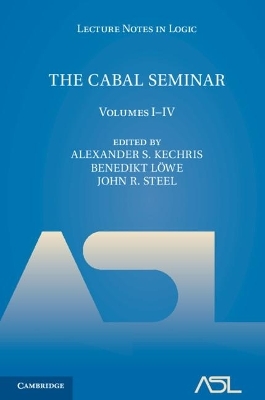
The Cabal Seminar 4 Volume Hardback Set
Cambridge University Press
978-1-108-92022-3 (ISBN)
The proceedings of the Los Angeles Caltech-UCLA 'Cabal Seminar' were originally published in the 1970s and 1980s. This series of four books collects the seminal papers from those proceedings, together with extensive unpublished material, new papers on related topics, and discussion of research developments since the publication of the original volumes. Volume I focuses on the subjects of 'Games and Scales' and 'Suslin Cardinals, Partition Properties, and Homogeneity', Volume II on 'Wadge Degrees and Pointclasses' and 'Projective Ordinals', Volume III on 'HOD and its Local Versions' and 'Recursion Theory', and Volume IV on 'Extensions of AD, models with choice', along with material important to the Cabal that does not fit neatly into one of its main themes. These four volumes will be a necessary part of every set theorist's library.
Alexander S. Kechris is Professor of Mathematics at the California Institute of Technology. He is the recipient of numerous honors, including the J. S. Guggenheim Memorial Foundation Fellowship and the Carol Karp Prize of the Association for Symbolic Logic. He is also a member of the Scientific Research Board of the American Institute of Mathematics. Benedikt Löwe is Universitair Hoofddocent at the Universiteit van Amsterdam, Professor of Mathematics at the Universität Hamburg and Fellow of Churchill College at the University of Cambridge. He is currently the president of the Deutsche Vereinigung für Mathematische Logik und für Grundlagenforschung der Exakten Wissenschaften (DVMLG) and the Secretary General of the Division for Logic, Methodology and Philosophy of Science and Technology (DLMPST). John R. Steel is Professor of Mathematics at the University of California, Berkeley. Prior to that, he was a professor in the mathematics department at the University of California, Los Angeles. He is a recipient of the Carol Karp Prize of the Association for Symbolic Logic and of a Humboldt Prize. Steel is also a former Fellow at the Wissenschaftskolleg zu Berlin and the Sloan Foundation.
Volume I: Part I. Games and Scales: Introduction to Part I; 1. Notes on the theory of scales; 2. Propagation of the scale property using games; 3. Scales on $/sum_1^1$-sets; 4. Inductive scales on inductive sets; 5. The extent of scales in $/mathbf{L}(/mathbb{R})$; 6. The largest countable this, that, and the other; 7. Scales in $/mathbf{L}(/mathbb{R})$; 8. Scales in $/mathbf{K}(/mathbb{R})$; 9. The real game quantifier propagates scales; 10. Long games; 11. The length-$/omega_1$ open game quantifier propagates scales; Part II. Suslin Cardinals, Partition Properties, Homogeneity: Introduction to Part II; 12. Suslin cardinals, $/kappa$-Suslin sets, and the scale property in the hyperprojective hierarchy; 13. The axiom of determinacy, strong partition properties, and nonsingular measures; 14. The equivalence of partition properties and determinacy; 15. Generic codes for uncountable ordinals, partition properties, and elementary embeddings; 16. A coding theorem for measures; 17. The tree of a Moschovakis scale is homogeneous; 18. Weakly homogeneous trees; Bibliography; Volume II: Part III. Wadge Degrees and Pointclasses: Introduction to Part III; 19. Wadge degrees and descriptive set theory; 20. A note on Wadge degrees; 21. Some results in the Wadge hierarchy of Borel sets; 22. The strength of Borel Wadge determinacy; 23. Closure properties of pointclasses; 24. The axiom of determinacy and the prewellordering property; 25. Pointclasses and wellordered unions; 26. More closure properties of pointclasses; 27. More measures from AD; 28. Early investigations of the degress of Borel sets; Part IV. Projective Ordinals: Introduction to Part IV; 29. Homogeneous trees and projective scales; 30. AD and projective ordinals; 31. A $/Delta_3^1$ coding of the subsets of $/omega_/omega$; 32. AD and projective ordinals; 33. Projective sets and cardinal numbers: some questions related to the continuum problem; 34. Regular cardinals without the weak partition property; Bibliography; Volume III: Part V. HOD and its Local Versions: Ordinal Definability in Models of Determinacy: Introduction to Part V; 35. Partially playful universes; 36. Ordinal games and playful models; 37. Measurable cardinals in playful models; 38. Introduction to Q-theory; 39. On the theory of $/prod_3^1$ sets of reals, II; 40. An inner models proof of the Kechris–Martin theorem; 41. A theorem of Woodin on mouse sets; 42. HOD as a core model; Part VI. Recursion Theory: Recursion Theoretic Papers: Introduction to Part VI; 43. On recursion in E and semi-Spector classes; 44. On Spector classes; 45. Trees and degrees; 46. Definable functions on degrees; 47. $/prod_2^1$ monotone inductive definitions; 48. Martin's conjecture, arithmetic equivalence, and countable Borel equivalence relations; Bibliography; Volume IV: Part VII. Extensions of AD, Models with Choice: A Brief History of Determinacy; 49. 'AD plus uniformization' is equivalent to 'half $AD_/mathbb{R}$'; 50. The independence of DC from AD; 51. Games of countable length; 52. Some consistency results in ZFC using AD; 53. Subsets of $/aleph_1$ constructible from a real; 54. AD and the uniqueness of the supercompact measures on $/wp_{/omega_1}(/lambda)$; 55. The extender algebra and $/sum_1^2$-absoluteness; Part VIII. Other Topics: 56. On Vaught's conjecture; 57. Capacities and analytic sets; 58. More saturated ideals; 59. The fourteen Victoria Delfino problems and their status in the year 2020; Bibliography.
| Erscheint lt. Verlag | 30.11.2020 |
|---|---|
| Reihe/Serie | Lecture Notes in Logic |
| Zusatzinfo | Worked examples or Exercises; 2 Tables, black and white; 10 Halftones, black and white; 24 Line drawings, black and white |
| Verlagsort | Cambridge |
| Sprache | englisch |
| Maße | 155 x 230 mm |
| Gewicht | 2400 g |
| Themenwelt | Geisteswissenschaften ► Philosophie ► Logik |
| Mathematik / Informatik ► Mathematik ► Angewandte Mathematik | |
| Mathematik / Informatik ► Mathematik ► Finanz- / Wirtschaftsmathematik | |
| Mathematik / Informatik ► Mathematik ► Logik / Mengenlehre | |
| ISBN-10 | 1-108-92022-5 / 1108920225 |
| ISBN-13 | 978-1-108-92022-3 / 9781108920223 |
| Zustand | Neuware |
| Informationen gemäß Produktsicherheitsverordnung (GPSR) | |
| Haben Sie eine Frage zum Produkt? |